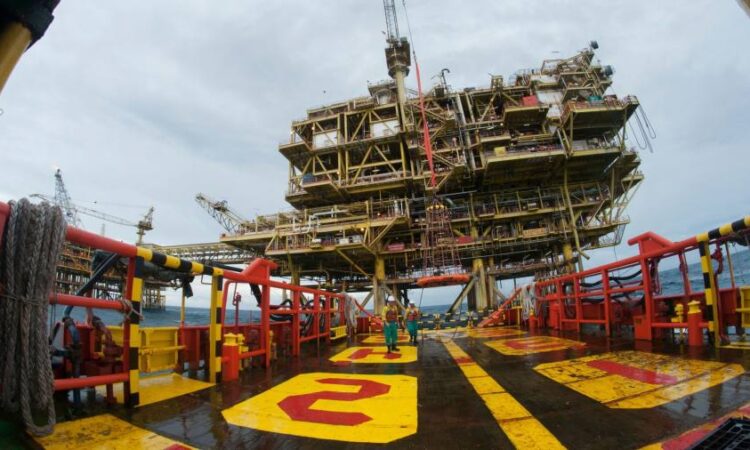
Receive free UK tax updates
We’ll send you a myFT Daily Digest email rounding up the latest UK tax news every morning.
The plunge in the price of oil and gas in recent months has led to a huge one-off drop in the cost of Britain’s energy support schemes but will also mean sharply lower revenues from the government’s windfall tax on North Sea producers over the next five years, according to official estimates.
In November, when chancellor Jeremy Hunt increased an existing windfall tax on the profits of oil and gas companies and extended it until 2028, the government predicted the so-called energy profits levy would raise as much as £41.6bn with a headline tax rate on the sector of 75 per cent.
But in the Treasury’s most recent forecasts from March the estimated tax take has dropped almost 40 per cent to £26bn, reflecting a sharp fall in the price paid for oil and gas in wholesale energy markets.
Since peaking close to $130 a barrel in March last year oil prices have fallen to about $75 a barrel while wholesale gas prices are down almost 90 per cent from their record highs to about 80p a therm.
Moreover, the government’s most recent official forecast is much higher than the estimates from some of the sector’s leading consultants. Based on an analysis of projected company profits in May, Wood Mackenzie calculated that the windfall tax could raise just £16bn by 2028.
The consultancy has always been more bearish than the government about the proceeds of the windfall tax, putting an estimate of £27bn on the increased and extended levy in November. The tax was introduced six months earlier in the wake of Russia’s full-scale invasion of Ukraine.
The anticipated sharp drop in forecast tax revenues illustrates the challenge for the government in raising funds from a notoriously volatile sector.
However, the loss of future tax income over the next five years is offset by an estimate £22bn drop in the cost of the government’s main energy support schemes for households and businesses since last year.
The two schemes are expected to cost £34.2bn compared to an original estimate of £56bn due to a fall in wholesale energy prices, according to the Office for Budget Responsibility.
But one official pointed out these were “one-off” savings for this year and did not represent “permanent savings to fund new multiyear spending commitments or tax changes”.
Graham Kellas, Wood Mackenzie’s head of fiscal research, said the windfall tax had been badly designed, as it had undermined confidence in the sector while being relatively slow to raise revenues.
“The government’s prediction of how much they get over the entire period of the windfall tax is going to be much less, whereas the money that they’ve spent — that these taxes were designed to cover — has already largely gone out the door.”
Carl Emmerson, deputy director of the Institute for Fiscal Studies, said the lower future revenues from the windfall tax would “not be welcomed” by the chancellor when the “medium-term health of the public finances really doesn’t look great”.
UK North Sea operators have strongly opposed the tax, arguing that it undermined the investment case for a mature hydrocarbon basin when raising financing for fossil fuel projects was becoming more difficult.
The government responded by introducing a floor for the windfall tax, which would see it cancelled if oil and gas prices both fall below a set level for two quarters. However, at the time it cited its own projections that suggested it would not be triggered prior to the tax’s expiry.
The Treasury admitted that oil and gas receipt forecasts were subject to a high degree of uncertainty. “It is right that we recover excess profits resulting from [Vladimir] Putin’s war and use the money to help families facing cost of living pressures,” it said. “We will receive an updated forecast from the OBR at the next fiscal event.”
The main opposition Labour party, which is leading in the polls ahead of an expected general election next year, has vowed to extend the windfall tax by backdating it to the start of 2022 and scrapping its generous investment allowance.






